Choosing between adjustable barbells vs fixed barbells feels like picking between convenience and pure lifting bliss. Short answer: adjustable = space-saving; fixed = smoother, stronger training. Want the full breakdown—and to see why our best-selling fixed barbells are favorites for home gyms? Keep reading and lift smarter.

Adjustable Barbells vs Fixed Barbells: Which One Is Better for Your Home Gym?
Adjustable Barbells vs Fixed Barbells — What’s the Real Difference?
What adjustable barbells are (quick definition)
Adjustable barbells are basically the “Swiss Army knife” of strength training. You load plates on, tighten them down, and the bar transforms into whatever weight you need that day. If you’ve ever trained in a tiny room or squeezed in a workout between meetings, this kind of flexibility feels like magic.
What fixed barbells are (quick definition)
Fixed barbells sit at the other end of the convenience spectrum. No collars, no disassembly, no fuss. You pick it up and get straight to work. They feel a bit like the loyal friend who’s always ready before you even finish tying your shoes.
Why this breakdown matters for home gym buyers
When you’re building a home gym, every decision gets amplified. Space matters more. Budget matters more. Time matters more. Choosing the wrong bar can either slow down your workouts or take up half your living room.
Related terms people also search
adjustable barbell, adjustable barbell set, fixed barbells, fixed weight barbell, curl barbell with weights, straight barbell, EZ curl barbell.
Understanding Barbell Features (Before You Compare Any Type)
Barbell Buying Guide essentials
A barbell may look simple, but its details matter. A cheap bar feels different, moves differently, and wears down faster. Once you’ve lifted with a good one, it’s hard to go back.
Key features: knurling, spin, sleeves, bearings, bushings
Knurling affects grip.
Spin affects smoothness.
Sleeves and their bearings decide whether your lifts feel clean or clunky.
These tiny details quietly shape your entire lifting experience.
Weight capacity — why it matters for progressive overload
If your training is going well, you’ll eventually outgrow weak equipment. When a bar bends or shifts under load, it becomes a distraction rather than a tool.
Barbell length and how it affects training space
Long bars stretch a workout into a full-body experience but need more space. Shorter bars fit tight areas but limit some movements. Your available room decides which direction makes sense.
Finishes and coatings (chrome, black oxide, cerakote)
Your bar’s coating protects against rust, sweat, and repeated use. If you train in a garage or basement, this becomes extremely important.
Types of Barbells Explained (Where Adjustable & Fixed Fit In)
Olympic Barbells
Best for dynamic lifts & Olympic training
These bars love speed and explosiveness.
Spin, whip & sleeve design
They bend and rotate smoothly to protect your wrists and shoulders.
Powerlifting Barbells
Stiffness & aggressive knurling
When you’re chasing heavy benches, squats, and deadlifts, stiffness is your friend.
Best for squats, bench & deadlifts
Built for pure strength, not fancy movements.
Deadlift Barbells
Why deadlift bars have more whip
They flex just enough to let you build tension before the real pull begins.
Technique Bars
Lightweight training tools for beginners
Learning form without risking injury is priceless.
EZ Bar
Joint-friendly curls & triceps training
Your wrists will thank you.
Hex (Trap) Bar
Safer deadlift & shrug patterns
Perfect for anyone who wants heavy lifts without beating up their lower back.
Swiss Bar
Multi-grip upper-body training
Great for people with shoulder pain.
Safety Squat Bar
Shoulder-friendly squatting
Keeps you upright and stable even on tired days.
Fixed Barbells
Fixed straight barbell
No assembly, no excuses.
Fixed EZ curl barbell
Ideal for fast-paced arm and upper-body training.
Adjustable Barbells — Benefits, Drawbacks & Best Use Cases
Benefits of adjustable barbells
Space-saving
Perfect for apartments, shared rooms, or anyone who lifts next to their couch.
Wide weight range with one bar
There’s something satisfying about watching a bar evolve from warm-up weight to working weight in seconds.
Budget-friendly for beginners
You can lift seriously without emptying your wallet.
Drawbacks of adjustable barbells
Slower weight changes
Changing plates feels fine at first, until the third superset and your hands are tired.
Lower durability & load limits
They’re not meant for consistent heavy lifting at max capacity.
Ideal users for adjustable barbells
Beginners, apartment lifters, and anyone who values flexibility above all else.
Fixed Barbells — Benefits, Drawbacks & Best Use Cases
Benefits of fixed barbells
Zero setup time
Grab, lift, done. It’s the closest thing to a fast-forward button in strength training.
Longer lifespan & higher durability
These bars are built to survive years of training and then some.
Perfect for strength circuits & classes
Great for tempo training and fast transitions between weights.
Drawbacks of fixed barbells
Require more storage space
More bars = more space needed.
Individual bars for different weights
You may eventually want a whole set.
Ideal users for fixed barbells
Home gym owners with dedicated space and people who lift often and want that quick, seamless training flow.
Head-to-Head Comparison — Adjustable vs Fixed
Space & storage needs
Adjustable wins small spaces easily.
Fixed shines when you have room to grow.
Weight range & progression
Adjustable gives huge range.
Fixed gives instant-access convenience.
Durability & long-term cost
Fixed barbells usually last decades.
Adjustable bars cost less upfront but may not go the distance.
Exercise versatility
Adjustable bars let you do more types of heavy lifts.
Fixed bars are unbeatable for circuits and conditioning.
Safety & stability during heavy lifts
Fixed bars don’t shift or loosen mid-lift.
Adjustable bars depend on how tight you secure the collars.
Best Barbells for Home Gyms (By Category)
Best adjustable barbell sets
Smart for beginners or tight spaces.
Best fixed barbells (20 lb – 115 lb)
Brands like Troy, TAG Fitness, York, Body Solid, Intek Strength, TKO, Escape Fitness, and VTX dominate here.
Best barbell set with rack
Ideal for full home gyms that want both organization and fast access.
Best straight barbell options
Versatile and compatible with Olympic plates.
Best EZ curl barbell options
Wrist-friendly and perfect for arm specialization.
Weight Plates & Compatibility
Olympic grip plates
Comfortable and easy to handle.
Rubber plates
Noise-friendly and home-gym approved.
Bumper plates
Quiet, durable, and perfect for dynamic lifts.
Urethane Olympic grip plates
Premium feel and long lifespan.
Cast iron Olympic plates
Affordable and compact.
Best-selling plate range: 2.5 lb – 100 lb
Great for progression at every experience level.
Which One Should YOU Choose? (Scenario Breakdown)
Small apartments → adjustable barbell
Saves space and keeps things simple.
Dedicated home gyms → fixed barbell
Convenience wins when you have the room.
Strength athletes → Olympic or power barbell + fixed barbells
Best setup for serious progression.
Class-style workouts → fixed straight & curl bars
No interruptions, no wasted time.
Care & Maintenance for Both Barbell Types
Cleaning knurling
A quick brush removes sweat and grime that shortens the bar’s lifespan.
Oil maintenance for sleeves
Just a small drop goes a long way to keep the movement smooth.
Preventing rust in garages
A wipe-down after training can save years off wear.
How often to check collars, bolts & end-caps
Every few weeks is more than enough to keep everything safe.
Final Takeaway — Adjustable vs Fixed Barbells
Choosing between adjustable and fixed barbells isn’t about right or wrong.
It’s about matching your space, your training style, and your future goals.
Fixed barbells bring durability and convenience.
Adjustable barbells bring versatility and a friendly price tag.
Whatever you choose, you’ll build real strength at home.
Explore our best-selling fixed barbells and barbell sets to level up your setup today.


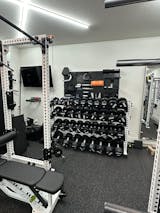


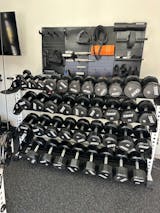
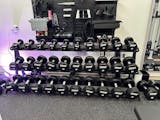
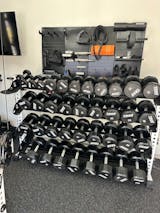


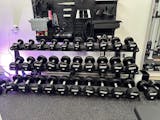

Leave a comment